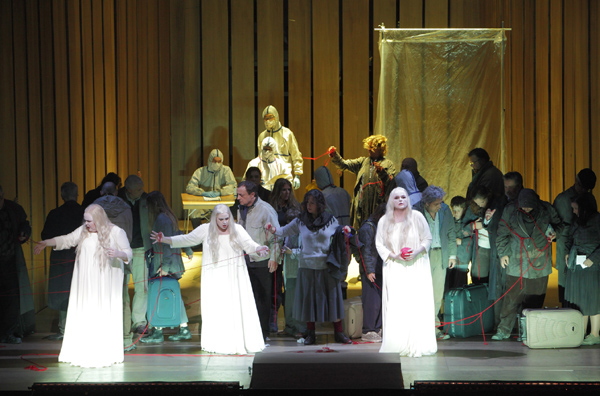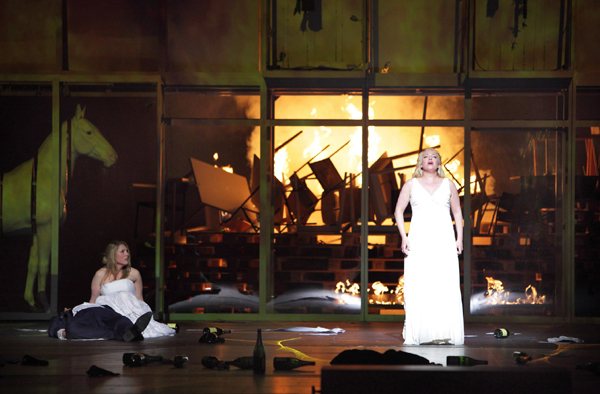 Germany R. Wagner, Götterdämmerung: Soloists, Kent Nagano (conductor), Bavarian State Orchestra, National Theater, Munich, 15.7.2012 (JMI)
Germany R. Wagner, Götterdämmerung: Soloists, Kent Nagano (conductor), Bavarian State Orchestra, National Theater, Munich, 15.7.2012 (JMI)
New Production
Direction: Andreas Kriegenburg
Sets: Harald B. Thor
Costumes: Andrea Schraad
Lighting: Stefan Bolliger
Cast:
Brünnhilde: Nina Stemme
Siegfried: Stephen Gould
Hagen: Erci Halfvarson
Gunther: Iain Paterson
Gutrune: Anna Gabler
Alberich: Wolfgang Koch
Waltraute: Michaela Schuster
Woglinde: Eri Nakamura
Wellgunde: Angela Brower
Flosshilde: Okka von der Damerau
First Norn: Jill Grove
Second Norn; Jamie Barton
Third Norn: Irmgard Vilsmaier

| The Munich Ring Cycle on S&H:Das Rheingold
Jens F Laurson (9.2.2012) Die Walküre Siegfried Götterdämmerung |
Andreas Kriegenburg’s Munich Ring Cycle came to a brilliant end. His Götterdämmerung combines a very interesting stage production, a great musical performance, and a remarkable cast. Above all Brünnhilde, who was not just a god’s daughter, but truly a goddess herself.
Kriegenburg has crowned the tetralogy with a Götterdämmerung that takes jabs at the abuse of capitalism and the crisis it has generated, which means a true twilight of the system, with references even to Fukushima thrown in during the opening scene. Gold and the ring are but symbols of power, in the pursuit of which all the crimes in the Tetralogy are committed. And there are quite a few (Fasolt, Siegmund, Hunding, Mime, Siegfried, Gunther, even Hagen) who make themselves guilty in the process. At the end of the opera I understood more clearly, at last, the whole idea of Kriegenburg’s direction and the use of the many extras, which now no longer seems to me capricious, but very well thought through. Selfishness, the greed for power, the struggle for gold, have brought destruction—let’s call it a crisis—culminating in Brünnhilde’s immolation and the return of gold to its origin. Interestingly, for the final notes of the motif of redemption, the entire group of extras come into stage, all dressed in white—the way Rheingold started out—to take the only survivor of the disaster (Gutrune) with them as their ranks close while the wonderful music gives a glimpse of hope for a better world. It is as if Kriegenburg indicted the selfishness of gods, Nibelungs, and Gibichungs as what has brought the crisis on, suggesting that only the common people, throughout unity and solidarity, will be able to solve the situation.
The extras have been working hard on stage: they gave form to the Rhine, they gave birth to the flower meadow and the forest in Siegfried, they suffered the oppression of Gibichungs (the only time when they were clad in black) and finally they sent a message of hope in the final minutes of the Tetralogy: A lovely message that I found profoundly moving.
The first act of Götterdämmerung opens on a huge lounge with several levels, something out of the headquarters of a large bank or media conglomerate via James Bond. This is the Gibichungs HQ. It is a modern impersonal setting where employees are curiously uniformed in Chinese style. I think Kriegenburg might as well have gone a step further and converted the stage into the headquarters of any political party today. In this large room the group of extras move a few props—mostly large wooden planks that form a make-shift hut—to give life to the scenes of Brünnhilde on her rock in Act I. In the last act the building is dilapidated and the opera ends with a spectacular funeral pyre at the back of the stage.
Hagen and Gunther are two depraved executives in search for power and money who casually abuse their staff, while Gutrune is a spoiled starlet, whose relationship with her brother is amorously ambiguous. When she gets bored, she lazily, lasciviously sways back and forth on her rocking horse in the shape of a golden Euro symbol. The chorus continually uses mobile phones to pass and receive messages and take pictures and it is worth seeing their excitement in the building as the news of the death of Siegfried get in.
Interesting as the production was—more profound than the previous installments and quite attractive—the true radiance came from the musical contributors. Kent Nagano was outstanding this time, as was his ever superb Bavarian State Orchestra, following right in their own footsteps from Siegfried. There were no cracks in Nagano’s Wagner-construct, but plenty richness and depth.
The cast also enjoyed an immense Brünnhilde, at once bright and deep. I do not know how many years it has been since we have had a Wagnerian soprano in the class of Nina Stemme. I never had the opportunity to see Nilsson, Varnay, or Traubel, but it’s hard to believe that they could have improved on what Nina Stemme has done in this Götterdämmerung. It’s too bad she didn’t sing the other two Brünnhildes.
Stephen Gould’s Siegfried fell short of my expectations. Obviously, the voice, a true heldentenor, is well suited to the character, but I’ve found him more forced than at other times. At the start of the third act he cracked a high note, but that was not indicative of things to come, and the whole narration of his exploits was solved satisfactorily even as he pushed on more than one occasion.
Eric Halfvarson was a deliciously smarmy, evil, charming Hagen. Iain Paterson’s voice is not very large and somewhat impersonal, but he solved his task as Gunther. Anna Gabler cut quite a figure as Gutrune with her outstanding stage performance. I suppose that this aspect prevailed in her choice rather than her purely vocal qualities, which are not outstanding. Wolfgang Koch repeated his spectacular Alberich, which made it a shame that the character appears only so briefly in this opera. Michaela Schuster finally made for a remarkable Waltraute, both as an actress and singer.
The Daughters of the Rhine proved they are a real (vocal) treat. Among the Norns, Irmgard Vilsmaier (Third Norn) left a very positive impression, while Jamie Burton (Second Norn) sounded shrill.
José M. Irurzun
